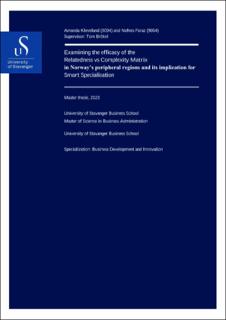| dc.description.abstract | While a relatively large body of literature deals with Smart Specialisation, understanding its potential in peripheral regions is still largely missing. The study builds upon economic research that advises policymakers to focus on related and complex activities. The aim is to assess whether the relatedness vs complexity framework developed by Balland et al. (2019) can accurately represent the situation in the periphery and if it can be utilized in the development of Smart Specialisation strategies. To achieve this, Norwegian registry data and case studies are analysed with a focus on 3 peripheral regions: Møre og Romsdal, Nordland, and Finnmark. The findings of the study indicate that the framework underestimates the complexity of activities in these regions, especially those that heavily rely on tacit knowledge. Consequently, the methodology used in the framework needs to be adapted to suit the local context. Additionally, the interpretation of results can be enhanced by utilizing the absolute average deviation of relatedness values. However, despite these limitations, the framework proves valuable as a monitoring and benchmarking tool, enabling policymakers to guide and oversee regional growth trajectories effectively. | |
